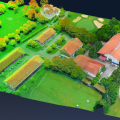The Defence Imagery and Geospatial Organisation (DIGO) will have its role examined as part of a review of all intelligence agencies commissioned by Julia Gillard.
DIGO was established under a Cabinet Directive on 8 November 2000 by amalgamating the Australian Imagery Organisation and Directorate of Strategic Military Geographic Information, and the Defence Topographic Agency.
Its role is to provide geospatial intelligence, from imagery and other sources, in support of Australia's defence and national interests- it serves both the military and intelligence communities.
The review will also analyse the work of the Australian Security Intelligence Organisation, the Australian Secret Intelligence Service, the Defence Intelligence Organisation, the Defence Signals Directorate and the Office of National Assessments.
"The review will ensure Australia continues to have a well-coordinated, appropriately resourced and adaptable intelligence system that supports our national interests," Gillard said.
It will be take place over the next six months and will be headed by the former secretary of the Attorney-General's Department, Robert Cornall, and Rufus Black, an ethicist from Melbourne university/
The review is the result of a recommendation in the 2004 Flood review of the intelligence agencies, which found they should be independently examined every five to seven years.







